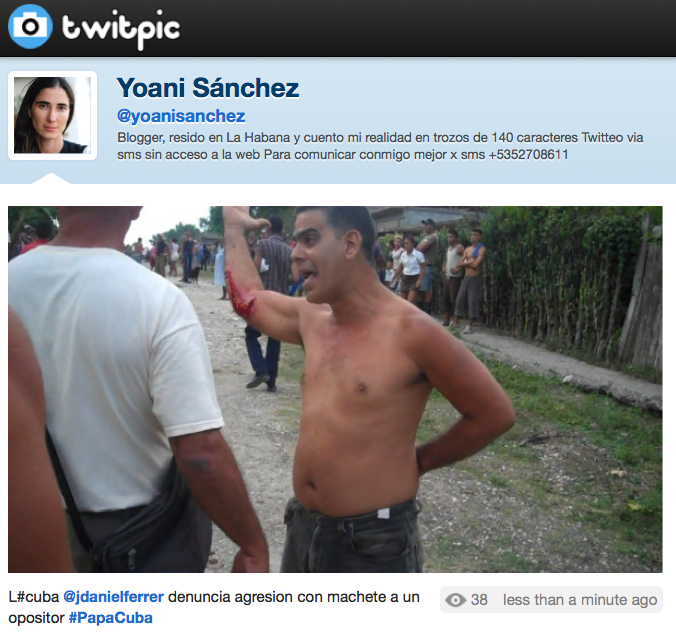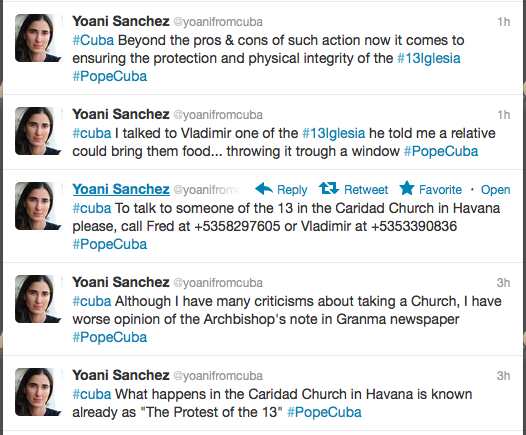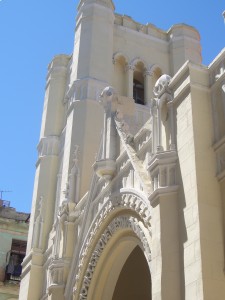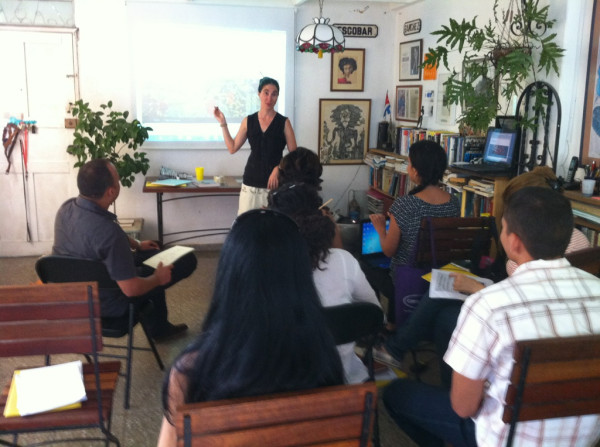Country of Pixels / Daniel Díaz Mantilla
Opponent slashed with machete / Yoani Sánchez
An Exclusive Conference / Mackandal – Manuel Aguirre Lavarrere
Whoever has seen a Negro whipped, can they not consider themselves forever in his debt? I have seen it when I was a boy and my cheeks continue to burn with shame… I saw it and I swore myself since then to his defense.
Jose Marti
Anyone who has followed closely the discussions held by the First Conference of the only party, the Communist Party of Cuba, may have noticed the lack of interest shown when the problem of racial discrimination within Cuban society was debated — if a dozen words spoken on the fly can be called debate.
It was not of prime importance, not even secondary, the issue of discrimination against blacks and mestizos in Cuba, which deserved, given the impact of racial exclusion of this segment of society, a separate chapter to take the bull by the horns and fully state the truths that the race issue warrants for the real improvement of the Cuban society.
But to seek a remedy from the same source that gives rise to the disease, as Jose Antonio Saco said, referring to vagrancy in Cuba, pushes, in a certain way at those Afro-Cubans still dependent on laws and rulings that have in practice proved their incompetence. The fight against racism requires comprehensive minds and thoughtful ideas, truly inclusive, of sensible men who must feel part of the problem to then be part of the solution.
Home, family and training through oral transmission from parents to children is a phenomenon that in Cuba has always functioned as a barrier of isolation and denial of rights against blacks and mestizos.
Racism is not eliminated with speeches. This situation in Cuba, as elsewhere in the world, needs a cleaning of the mind, whose final result is to provide ideas capable of resulting in its final exile from the national soil.
We must keep in mind that the influence of white racists politicians and officials now in Cuba, has worked effectively and smoothly, as an exclusion barrier against blacks and mestizos.
A phenomenon is born and branches out through an ideology, as has, without a doubt, racism, where the silent complicity, the political neglect and opportunism are factors that inevitably in turn are linked to corruption, and with logical repercussions that in the law of severity in the abuse and disregard for other people to justify the denial of their rights, requiring forced affirmative action to protect and defend the rights of this population segment.
Disappointing to those who fill their bellies, steal and think themselves gods on obtaining unearned privileges as the cost of the suffering of others, when hey speak of men and women who do not have the right to protest without life sentences in prison hanging over them, or an “accidental” death.
February 16, 2012
“Although I have many criticisms about taking a church…” / Yoani Sánchez
Note: Yoani’s Twitter translating into English can be accessed here.
A Necessary Petition to the Pope / Yoani Sánchez
The Petition in English:
Pope Benedict XVI
We the undersigned call on the generosity of His Holiness, Pope Benedict XVI, asking him to support a call for justice for Cubans during his visit to Cuba :
A. – Cease the repression, the humiliations and the beatings against the Ladies in White and other dissidents in Cuba.
2. – The right of Cubans to freedom of expression and association without being assaulted and jailed because their opinion is different from that of the government.
In 1998, His Holiness Pope John Paul II visited the island and publicly called for> “Let Cuba open itself to the world and let the world open itself to Cuba.” 14 years later, the same violations and restrictions of movement and expression set by the government are still in force, we make this request so that peace and love prevail in our country:
“LET CUBA OPEN ITSELF TO CUBANS.”
We dare to ask your Holiness to publicly support and to meet with the Ladies in White and other members of dissidents during your visit to Cuba.
15 March 2012
Additional Names of the “Church 13” Protestors / Yoani Sánchez
- Niola Camila
- Yeniet Hernandez
- Yenifer Hernandez
- Vladimir Calderon
- Ivet Calderon
- Madelaune Caraballo Betancourt
- Miguel Lopez Santos
- Orlando Corso Gonzales
- Daysi Pons
- Rouniel Valentin
- Emilio Torres
- Yudit Ferrer
- Yuriet Garcia
Translator’s note: Spellings of the names vary in different sources.
15 March 2012
Opponents occupy a church in Havana; the church hierarchy calls the protest “vindictive and inappropriate” / Mario Hechavarria Driggs
Protests in La Iglesia de la Caridad.
Members of the Republican Party of Cuba (PRC) and the November 30 Movement, remain entrenched from the afternoon of Tuesday 13, at the Shrine of Our Lady of Charity, located in the Havana municipality of Centro Habana.
The opponents demand an end to repression and violations of human rights. In addition to presenting a set of demands to the Cuban authorities, looking to the upcoming visit of Pope Benedict XVI they demand the following:
- Unconditional freedom for all political prisoners
- An end to repression and persecution of regime opponents
- Freedom of Association and Expression
- Right of entry and departure, and an end to the “White Card” exit permit
- Access to uncensored information, including the Internet
- Right to private property.
- Vladimir Calderon executive director of the PRC
- Roinier Valentine (PRC)
- Fred Calderon (PRC)
- Yudiht Segura (PRC)
- Yosiel Guia Piloto (PRC)
- Miguel Lopez Santos (Movement November 30)
- Emilio Torres Perez (November 30)
- Pastor Perez Sanchez (November 30)
- Madelaine
- Lazara Caraballo
- Neola Camila
- Daysi Ponce Arencibia
The Chancellor of the Church, Monsignor Jose Ramon Suarez Polcari and the pastor of the Church of Our Lady of Charity, priest Roberto Betancourt, met with the opposition to ask them to leave the church, but they refused.
Vladimir Calderon said by telephone that the attitude of the church hierarchy was threatening:
“They told us that the protest was improper and vindictive, that the Church was not a shelter and they would be forced to denounce us to the police.”
In the evening, State Security cut the phone connection and maintain a cordon around the sanctuary, a police crackdown on the protesters is feared.
14 March 2012
Praise for the Cowardly / Wendy Iriepa and Ignacio Estrada
Havana has carried out a process of appropriation of post-Marxist nationalism, through a nearly mystic cult of the figure Jose Marti, at the same time attempting the depoliticization of writers and artists.
The mechanism of terror employed by a dictatorship fails only with one social group: the intellectuals.
It’s not necessarily that the intellectuals are the most valuable citizens. It could be that among them are the most cowardly, but they demonstrate a larger capacity for assimilation and resistance. They are also the ones that transcend.
Jorge Edwards, in his biography of Pablo Neruda, “Goodbye, Poet,” says: “I always found Fidel irritated in the presence of writers, suspicious, as if that precarious power that they maintain, that which allows them the use and the art of words, embitters in some way, in his most vital and sensitive nucleus, his own power.”
The biography on Stalin by Edward Radzinsky narrates the preparation of judgment at Babel y Meyerhold, that would involve figures like Einstein, Katoyev and Ehrenburg. But in the course of the interrogations, Stalin lost faith that the intellectuals would play their part just as it was planned. He stopped confiding int he process, as, for example, Babel admitted everything and later retracted it. Stalin decided that artists are “unpredictable types,” to a dangerous level: that they too easily admit invented faults, but with that same ease negated what was said a minute ago. So he opted to kill them quietly.
In Cuba, Ernesto Che Guevara raised more starkly the conflict between intellectuals and the government, stating: “The original sin of the Cuban intellectuals is that they are not true Revolutionaries.” The phrase could have been reversed: the first sin of the Cuban Revolutionaries has always been that they are not intellectuals (begging pardon from Jose Marti), or worse still, that they are false intellectuals, but Che was a proud man.
With The triumph of the Revolution, a guilt complex was imposed on the intellectuals. Roberto Fernández Retamar (did he go on to be Catholic?) expressed it in an unhappy verse: “Who died for me in the slaves’ prison? We the survivors, to whom do we owe our survival?”
The complex of guilt for not have been a terrorist or executioner extends over the first stage of Cuban literature before the first of January 1959 — dominated by Sartre’s existentialism — and is transformed into a complex of the proletariat class, for not being a manual laborer, in the later literary generations.
More than half a century after the Revolutionary triumph, years also marked by the failure — of the diaspora, the United States and a good part of the international community — when it comes to offering a “democratic enlightenment” based in liberty, and the possibility of the existence of a representative government as a counterpart to the “socialist enlightenment,” built on a frustrated project of social justice, the regime continues to be one-party and persists in calling itself “Marxist-Leninist,” despite the signs of exhaustion of the model.
However, the ideological exhaustion of Marxist-Leninist model has not led to a collapse of the system, much less has it led to greater external influence. If those living under Cuban socialism are subjects molded into believing that the State must carry out a wide distribution of rights and social benefits — something never accomplished, always justified with the pretext at hand: underdevelopment, blockade, the end of the socialist camp, the international economic crisis — they have also been socially conditioned in the constant postponement of the moment at which they will be able to exercise their civil and political rights in freedom.
The government in Havana has done everything possible to maintain this condition, steering according to the time without letting go of control of the course. To perform this maneuver, the regime in Havana has not only headed up a process of redefinition and appropriation nationalism leaning toward Marxism — supported by an almost mystical cult around the figure of Jose Marti — but has also developed a tactic based on the depoliticization of writers and artists — marked by the passage of the “organic intellectual” to the neutral creator — exemplified the forgotten quasi official Communist poet Nicolas Guillen and the canonization of the Catholic Jose Lezama Lima Catholic and Origenes (Origens) magazine.
To sustain these ideological treats, the regime in Havana has needed to control both reading and writing. Although in both cases progress has been made in Cuba, beyond specific cases genres and historical moments mentioned, even the Cuban government and the intellectuals who defend its cultural policy based on an administration territorial in the creation and practice of an ideological filter, which allows some to pass and others not. Although not published in Cuba it can not be considered synonymous with the unread on the island, the presence of marginalized books, topics and authors is not strong enough to break the logic of exclusion.
In this sense, Cuba becomes part of another world, largely alien to the West: A species of Africa, where the conditions for the preservation of the species are created by a band of outlaws disguised as guardians of the park, who obey the orders of the great hunter. Here the attempts to devalue the role of intellectuals are more serious for several reasons.
While on the one hand, the complex relationships between writers and the revolutionary process are still under dispute on the island and in exile, there is a labor of a erasing and re-telling by the regime in Havana, which aims to dilute the need for a moral and civic orientation in the country. it is an attempt at the trivialization of censorship: a minister of culture who displays a mane of ancient curls, rock and rap concerts, a statue of John Lennon opened to great fanfare, the appearance of banned works by exiled writers already dead.
Late acts and gestures. A policy of cages with the doors open but watchers at all four corners. Outdoor zoos for tourists. In return, a systematic effort to tame the group. A tactic of not using the stick but the carrot.
For unlike Europe, where the intellectual class’s ability to influence was diminished as a result of political and social change — which has benefited leaders and businesspeople — in Cuba there is a government campaign to replace the repression against writers and artists, wherever possible, by a controlled permissiveness. Circumstances differ, but the goal is the same: to limit the power of a social group.
To control the intellectuals continues to be an interest of the Cuban regime, and efforts in this regard are not underestimated. The government in Havana does not feel safe. Among its fears is that any moment the intellectual says: “On one side Comrade Mauser” and takes the floor.
From: Alejandro Armengol, Miami, 06/09/2011 Cubaencuentro.com
Translated by: Boston College Casa
February 27 2012
Writing What my Conscience Dictates (I) / Pablo Pacheco Avila
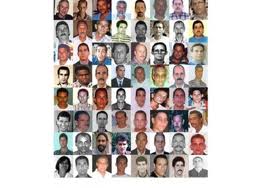
Writing what one’s conscience dictates in a totalitarian system represents a grand risk for those who break the barriers of silence which the soldiers impose. Generally speaking, those who are brave end up in prison, exiled, and in the worst of cases in a cemetery. Despite this, continuing to write without censoring our thoughts means to strengthen that free soul which we all carry inside.
Luckily for Cuba, while the State-run media assumes the role of the submissive spokesperson of the longest dictatorship of the Western hemisphere, others decided to describe the cruel reality in which Cubans live. If the crackdown of March 2003 was the reflection of hate and intolerance of a regime, the brutal deportation of various dissidents to Spain is proof that nothing has change on the island. It is just a cosmetic sign of “open-ness” which is far too absurd.
On March 19th, 2003, as I was taking an afternoon nap with my son, a large number of State Security agents knocked on my door. I was arrested and taken to a cell of the political police in the province of Ciego de Avila.
One week later, I was able to see my wife again and she told me that the soldiers forced my son Jimmy to wake up so that they could search the mattress in search of proof to incriminate me. At that moment, I did not imagine that I would spend 87 months behind bars. One day before my 33rd birthday, I met for the first time with my lawyer and she was the one who told me the trial would be held on April 4th. A fiscal petition of 26 years imprisonment weighed over my head. The trial was nothing more than a Roman Circus. The Communist Party members and the soldiers played the role of Cesar, while the fiscals and judges represented the lions, and the defense lawyers were just spectators. Pedro Arguelles and I were the slaves being sacrificed. After various hours in that judicial parody, we were both sentenced to 20 years of prison.
Oleivys was left in the mercy of the goodwill of a few friends which followed their human instincts and tore apart their ideological indoctrination, in addition to the hostility of the authorities from the Ministry of Health for which she worked. To this they added an additional punishment of forcing her to travel 360 kilometers with our 4 year old son in order to see me. Oleivys, with her strong and optimistic character, stood back up again. The separation forced her to be a mother, a father, a sister, a friend, and confident of Jimmy. He was the one who least understood what was happening. Day after day, he would ask his mother when his father was going to return. My other half, finding strength somewhere inside of her, would respond with pain: when he finishes studying.
“Every night, I would submerge myself in a sea of tears”, Oleivys now tells me, after she surpassed the storm.
Translated by Raul G.
14 March 2012
Yoani Continues WordPress Classes / Yoani Sánchez
The Church is Sacred / Adolfo Fernández Sainz
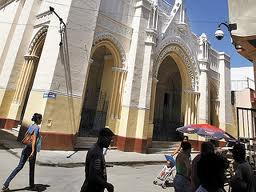 With respect to what other opponents can do in Cuba, this is my opinion.
With respect to what other opponents can do in Cuba, this is my opinion.
To me it seems like a great mistake to “take” a church by assault as if it were a military base. I they had protested in front of the Communist Pary offices that would have been good. I they had gone as a group to talk with the church authorities, that wouldn’t have been all bad. But to entrench themselves in a church is playing State Security’s game.
The best thing they can do at this point is to obey what the priest in charge of the church tells them. Not to offer any resistance to the Church. These are not the ways to ask something of the Pope.One does not demand things from the Pope. Leave it in the hands of the Ladies in White’ who are doing it divinely. The Ladies in White are asking Santa Rita to intercede for the Pope to grant them a minute. This is the only way. Our opposition has always been peaceful and civilized.
In any event, God writes straight with crooked lines. The crooked lines we make ourselves, there God writes straight because He is God.
Perhaps He can take something good from this.
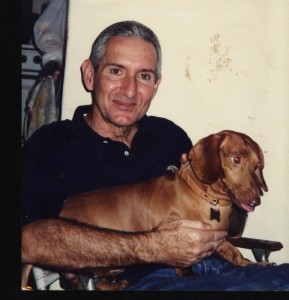 Translator’s note: Adolfo Fernández Sainz, a journalist, was one of the 2003 Black Spring political prisoners. He was released in 2010 and sent into exile in Spain. He now lives in the United States. This text was posted on the blog of Jose Luis Garcia Paneque, another of the Black Spring political prisoners.
Translator’s note: Adolfo Fernández Sainz, a journalist, was one of the 2003 Black Spring political prisoners. He was released in 2010 and sent into exile in Spain. He now lives in the United States. This text was posted on the blog of Jose Luis Garcia Paneque, another of the Black Spring political prisoners.
15 March 2012
Tracey Eaton’s Interview with Iván García
Country of Pixels / Daryll Hernández Vázquez
Words Like Fists / Rebeca Monzo
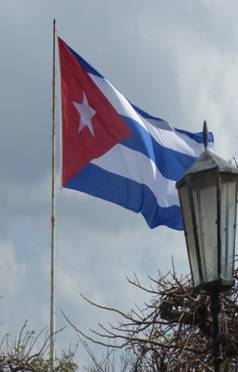 With great exaltation and emotion I read the Open Letter by Antonio Rodiles published on the digital site Diario de Cuba.
With great exaltation and emotion I read the Open Letter by Antonio Rodiles published on the digital site Diario de Cuba.
Every word he wrote, every phrase, hit my heart like a closed fist. In all these sad years of Revolution I have never read a document so civic, so virile, so brave.
My congratulations and absolute solidarity with this compañero, who, without losing the sanity, education and civility that characterize him, has known how, with the greatest transparency, to unmask the regime that, for more than half a century, has kept our people in the cruelest isolation and sought to deprive us of knowledge.
March 14 2012











